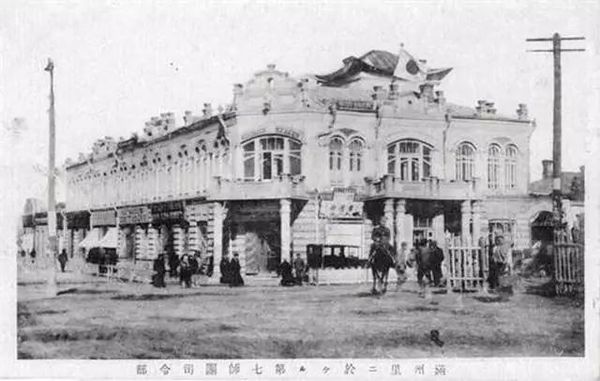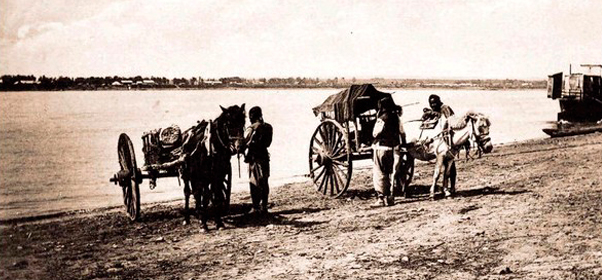As the Russian Civil War heated up, Chinese officials in Beijing and the localities were confronted with a thorny problem: discharging China’s obligations to the Allies while maintaining border security. The former meant tolerating White movements within Chinese territory, permitting them to recruit and re-arm in safety. Yet, if anything, this further destabilised the frontier and placed China in an awkward position with regard to the Bolsheviks – to say nothing of Japan’s desire to use the Civil War as a platform for Siberian expansion.
These tensions were especially marked in Manzhouli. As Semenov retreated into China in early March, border officials were obliged to grant him entry and allow him to be supplied with Allied weapons. Simultaneously, however, these “men on the spot” negotiated with the Reds to alleviate the conflict and restore communications.

稅務司所稱伊滿通車一節,實有其事。過激黨進據馬碟子時,經駐滿張總司令派員阻止侵入華境。該黨允諾,惟要求驅逐謝米拉夫出境,或解除武裝。並云,伊滿之車數日不通,現有華工二千余人,並中日駐使均在途中停滯,食料缺乏,急需開車,請求車行到滿時,由我軍擔任保護,免為謝隊所擾。該總司令當時通車一事暫行允諾,並聲明須由華軍檢查,如有武裝或可疑之人,即予解除扣留。所有當時彼此商洽情形及各使過境、華工回國各節,曾經分報在案。
現據該總司令報稱:
「已派員與該激黨口頭議定條件如下:
一、前所要求解除謝隊武裝及驅逐出境,暫作無效。
二、謝隊如出滿境攻擊激黨,請華軍擔任先一星期通告該黨。當答以須一星期后方能定奪。惟承認三星期以內絕不出境擊彼。
三、激黨一律遣回大烏里以西,斜拉宋、馬碟子二站祇准駐激黨兵十名。
四、自十七日起,華開通車入俄,車准激黨在大烏里檢查,入滿車歸我軍在八十六號小站檢查」等語。正擬據情報告,適准軍部電屬查復。查西伯利亞路線以滿站為終點,使外國火車自由入境,本前清交涉失敗之點。現既未奉政府禁止通令,江省自不能拒絕入境。惟該總司令與訂檢查辦法,尚屬嚴密,應否照此辦理,抑或不准通車,即請核示遵辦。
Regarding the Maritime Customs report that trains are running between Irkutsk and Manzhouli, this is accurate. When the Bolsheviks took Matsievskaia, Manzhouli commander Zhang [Huanxiang] sent a representative to prevent them from invading Chinese territory. They consented, only demanding that Semenov be expelled or disarmed. Furthermore, they said that trains from Irkutsk to Manzhouli had been blocked for several days, and now more than 2,000 Chinese workers and the Chinese and Japanese ambassadors were held up en route with food running out. It was urgently necessary to run the trains. They requested that when the trains reached Manzhouli, Chinese troops should be responsible for protecting them to avoid harassment from Semenov’s forces. The commander then temporarily agreed to the trains’ passage, and stated that the trains would have to be inspected by Chinese troops. If there were any armed or suspicious people, they would be disarmed and apprehended. The circumstances surrounding these negotiations, as well as the arrival of the ambassadors and the return of the Chinese workers, have previously been reported on.
A report now arriving from the commander states:
“The representative has verbally agreed to the following terms with the Bolsheviks:
1. The previous demand that Semenov’s forces be disarmed and expelled will be temporarily dropped.
2. If Semenov is to leave Manzhouli to attack the Bolsheviks, could Chinese troops undertake to inform them one week in advance? The representative replied that this could only be decided on after one week. But it was allowed that Semenov would definitely not leave the border to attack them within three weeks.
3. The Bolsheviks will all decamp west of Dauria, with only ten soldiers in Sharasun and Matsievskaia.
4. From the 17th [of March], Chinese trains entering Russia may be inspected by the Bolsheviks at Dauria. Trains entering Manzhouli will be inspected by Chinese troops at 86th Station.”An account of this was being prepared when the Army Ministry wired about it. The Trans-Siberian railway terminates at Manzhouli. That foreign trains are permitted to enter the border freely stems from a failure of former Qing diplomacy. Since no orders have been received from the Government on prohibiting this, Heilongjiang naturally cannot stop them from entering. However, the commander’s agreed inspection procedure is still sufficiently stringent. As for whether we may proceed with this or prohibit passage entirely, I defer to your instructions.
Telegram from Bao Guiqing, 22 March 1918 (sent 21 March). Zhong-E guanxi shiliao, Minguo liunian zhi banian (1917-1919). Dongbei bianfang (1), pp. 116-117.

The agreement between Zhang and the Reds not only de-escalated the situation at Manzhouli for the moment, but also restored some order on the railway. It allowed the Chinese and Japanese ambassadors – who, like their Allied colleagues, had been evacuated from Petrograd following the German advance in February – to leave Russia. One of the few convoys of repatriated Chinese wartime labourers, trapped in Russia after the collapse of the Russian army, could return home. Equally satisfying was the arrangement allowing the Chinese to guard and inspect incoming trains, a sign that the Reds were willing to respect Chinese sovereignty.
Rumours regarding the negotiations soon reached Allied diplomats and the British press. When the Russian and British ambassadors protested, Foreign Minister Lu Zhengxiang denied all knowlege of the talks despite having received Bao’s reports. Later, in a 26 March meeting with British Ambassador Sir John Jordan, Lu admitted to the agreement but said that it had been concluded under duress. He claimed that the Bolsheviks had threatened to mistreat the returning Chinese workers if their demands went unmet. For his part, Jordan reiterated the British stance: China should not hold Semenov back.
With the Allies unshaken in their support for the ataman, Beijing could only extract a milquetoast promise from Ambassador Kudashev to restrain Semenov:
鶴翔云:茲奉部長之命來告貴使,日前經由長春運交薩氏之軍火,悉已接到,惟薩氏實力不足,本國守邊軍隊猶未調集,協商各國對於廣義派並未表示何種態度,本國亦未經與該派宣言戰爭,此次放運軍火之事,固不足為他人道。倘薩氏輕啟戰爭,如果失利,中國所處地位礙難任其不除武裝再入本國境內。因屆時再許自由入境,即為敵視該派之表証,容或結怨該派,率師臨邊,此種景象中國本意不願及此,故請貴使注意,迅速電告薩氏,毋啟舋端,所有軍火亦當儲藏於后。
庫使云:本星期二見段總理后,業經致電薩氏,囑其謹慎從事,至軍火均由霍氏支配。
鶴翔云:請貴使以本國政府之意轉達霍氏,務將軍火儲藏於后。
庫使云:即當電達霍氏。Zhu: I received instructions from the Minister to inform Your Excellency that the arms shipped to Semenov via Changchun the day before have all been received. However, Semenov’s strength is lacking and our country’s border defence forces have not yet been mustered. The Allies have also not made their attitude towards the Bolsheviks known, and our country has not declared war on the Bolsheviks either. This shipment of arms could not be disclosed to others in the first place. If Semenov were to arbitrarily do battle and lose the advantage, in China’s position it would be difficult to allow him to re-enter our country’s borders without disarming him. For, if he is allowed to enter freely when the time comes, it will be taken as proof of enmity towards the Bolsheviks. This may earn their hostility and they will lead their forces to the border. China sincerely wishes that the situation will not come to this. Hence, could Your Excellency bear this in mind and quickly inform Semenov not to start a conflict and keep all the weapons in the rear.
Kudashev: After meeting Prime Minister Duan this Tuesday, I wired Semenov instructing him to act conscientiously. The weapons are all at Horvath’s disposal.
Zhu: Could Your Excellency convey my country’s intentions to Horvath, that the weapons should be kept in the rear.
Kudashev: I will convey this to Horvath immediately.Meeting between Foreign Ministry Secretary Zhu Hexiang and Kudashev, 30 March 1918. Zhong-e guanxi shiliao Minguo jiunian zhi banian (1917-1919). E zhengbian yu yiban jiaoshe (1), pp. 320-321.

Kudashev had no intention of reining Semenov in. Indeed, the Chinese could hardly expect the freshly rearmed Whites to stay put in Manzhouli, and both the Army Ministry and Military Governor Bao took a dim view of such assurances. Given Allied pressure, however, little could be done except wait for the Bolshevik deadline to expire.
These early engagements shaped Chinese attitudes towards both factions in the Civil War. The Whites appeared to be frontier troublemakers, eroding China’s security and sovereignty while making disingenuous promises. On the other hand, the Reds abided by the Manzhouli agreement, keeping clear of the Chinese border and coming to a mutually acceptable arrangement on the railway checkpoint. Over the course of the Civil War, China’s experiences with both factions would further corroborate these impressions – that is, until the Reds were strong enough to dictate terms in the Far East.

Pingback: Showdown at Manzhouli – Shots Across the Amur 黑龍江對岸的槍聲
Pingback: Defeat and Flight at Blagoveshchensk – Shots Across the Amur 黑龍江對岸的槍聲
Pingback: The Revolt of the Czechoslovak Legion – Shots Across the Amur 黑龍江對岸的槍聲
Pingback: China Joins the Siberian Intervention – Shots Across the Amur 黑龍江對岸的槍聲
Pingback: Conflict at Manzhouli – Shots Across the Amur 黑龍江對岸的槍聲
Pingback: Chinese Recruits in the White Movement – Shots Across the Amur 黑龍江對岸的槍聲
Pingback: China’s Contributions to the Siberian Intervention – Shots Across the Amur 黑龍江對岸的槍聲